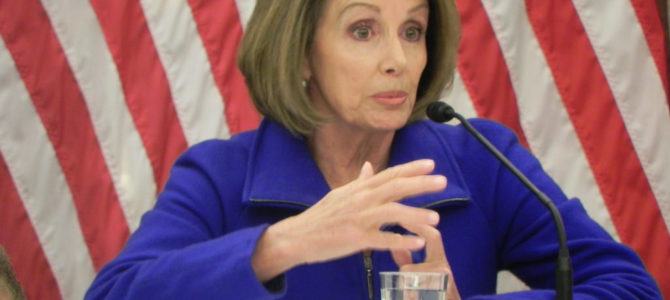
House Speaker Nancy Pelosi said Wednesday she thinks the Trump administration should continue to work with congressional Democrats on passing legislation even as they pursue an impeachment inquiry against the president.
Pelosi opened a Wednesday press conference with Rep. Adam Schiff, chair of the House Intelligence Committee, not by giving an update on the impeachment probe but by talking at length about various legislative initiatives such as reducing prescription drug prices, addressing gun violence, and finalizing the trade deal between the U.S., Mexico, and Canada.
She said there’s no reason the White House couldn’t work with Congress on these matters while congressional Democrats pursue their impeachment inquiry. If Trump refused to work with the lawmakers seeking his removal from office, Pelosi said, “that’s on him.”
It’s a strange standard to apply to a situation of Pelosi’s own making. Does she really think any legislation will move now that she’s taken the remarkable step of opening an impeachment inquiry? Impeachment, by its very nature, stops all other legislation. If the House does impeach, which it certainly will, nothing but the impeachment trial can be taken up in the Senate. Until this whole thing is over and done with, it’s all Congress is going to do.
Pelosi surely understands this, and her comments about wanting to work with the president for the sake of the American people in spite of the impeachment investigation ring hollow. She knows that all legislation, and any ability for the White House to work with congressional Democrats, died the moment she opened an impeachment probe.
Schiff Is Leaning Hard on the State Department
Speaking of the probe and Democrats’ bad faith, Schiff said Democrats “are deeply concerned about Secretary Pompeo’s effort now to potentially interfere with witnesses whose testimony is needed before our committee.” House Democrats last week subpoenaed Secretary of State Mike Pompeo and five other State Department officials with knowledge of Trump’s recent interactions with Ukraine.
Pompeo responded Tuesday with a letter to House Foreign Affairs Committee Chairman Eliot Engel slamming Democrats for trying to “intimidate” and “bully” State Department employees. “I will use all means at my disposal to prevent and expose any attempts to intimidate the dedicated professionals whom I am proud to lead and serve alongside at the Department of State,” Pompeo wrote.
I’m concerned with aspects of the Committee’s request that can be understood only as an attempt to intimidate, bully, & treat improperly the distinguished professionals of the Department of State, including several career FSOs. pic.twitter.com/QRtMaXlhQM
— Secretary Pompeo (@SecPompeo) October 1, 2019
Schiff, Engel, and House Oversight Committee Chairman Elijah Cummings replied Tuesday with their own accusation of intimidation. “Any effort to intimidate witnesses or prevent them from talking with Congress — including State Department employees — is illegal and will constitute evidence of obstruction of the impeachment inquiry.”
Schiff repeated this remarkable claim Wednesday, saying that if Pompeo “interferes,” it will create an “adverse inference” that the allegations against Trump are in fact true.
Pelosi Is Running a Blatantly Partisan Impeachment Probe
All of this demonstrates the bad faith with which Democrats have undertaken their impeachment probe from the start. From the outset, Pelosi has refused to hold a formal vote of the entire House on whether to authorize a formal impeachment investigation, marking a clear break with historical precedent. In the impeachment inquiries of both Richard Nixon and Bill Clinton, a formal vote of the entire House was held to authorize the House Judiciary Committee to begin an investigation to determine whether to draft articles of impeachment.
Such a vote isn’t a mere formality. Beyond giving the American people an idea of how bipartisan the probe is — the vote passed 410-4 in Nixon’s case — a formal vote can help determine how the investigation will play out. For example, as the Wall Street Journal’s William McGurn noted this week:
In 1974, Rep. John Conyers, a member of the Judiciary Committee, helped draft the articles of impeachment against Nixon. A quarter-century later, when a Republican House was about to impeach Bill Clinton, he insisted that the minority be granted subpoena power along with the majority. Democrats were given that power in the Clinton impeachment, just as Republicans had it in Nixon’s — but it’s tellingly absent in Mrs. Pelosi’s bid against Mr. Trump.
This is no small thing. House Democrats plan to issue a subpoena Friday to acting White House chief of staff Mick Mulvaney for transcripts, recordings, and notes related to two phone calls Trump had with Ukrainian President Volodymyr Zelensky in April and July.
The question is, will House Republicans be able at any point in this impeachment probe to issue subpoenas? Will they have any roll at all? Pelosi has said the impeachment process must be fair and bipartisan. She said at the press conference she’s going to run an “honorable” impeachment inquiry. So far, to no one’s surprise, it looks blatantly partisan.








